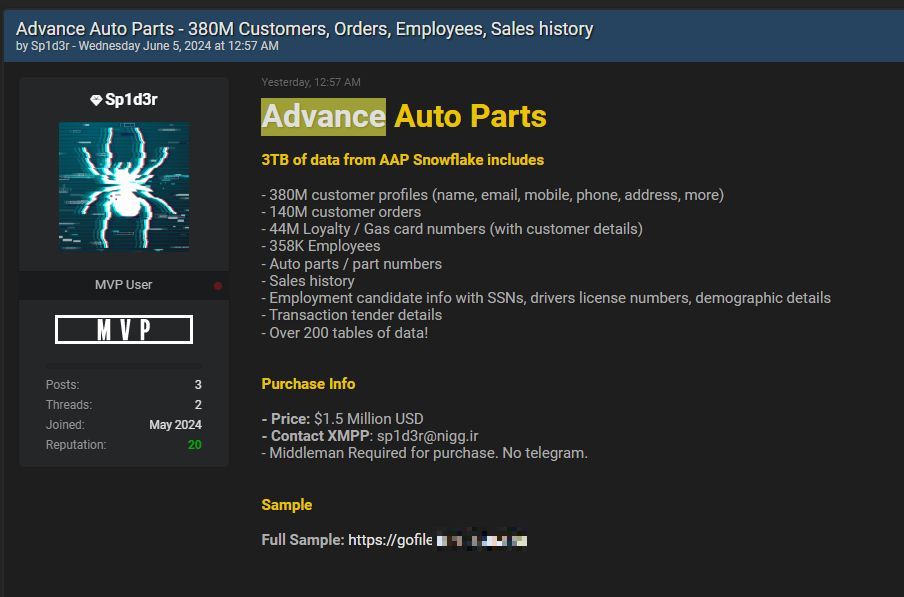
Advance Auto Parts customer data posted for sale
7.4 High
AI Score
Confidence
Low
A cybercriminal using the handle Sp1d3r is offering to sell 3 TB of data taken from Advance Auto Parts, Inc. Advance Auto Parts is a US automotive aftermarket parts provider that serves both professional installers and do it yourself customers.
Allegedly the customer data includes:
- Names
- Email addresses
- Phone numbers
- Physical address
- Orders
- Loyalty and gas card numbers
- Sales history
The data set allegedly also includes information about 358,000 employees and candidates—which is a lot more than are currently employed by Advance Auto Parts (69,000 in 2023).
The cybercriminal is asking $1.5 Million for the data set.
 Cybercriminal offering Advance Auto Parts data for sale
Cybercriminal offering Advance Auto Parts data for sale
Advance Auto Parts has not disclosed any information about a possible data breach and has not responded to inquiries. But BleepingComputer confirms that a large number of the Advance Auto Parts sample customer records are legitimate.
Interestingly enough, the seller claims in their post that the data comes from Snowflake, a cloud company used by thousands of companies to manage their data. On May 31st, Snowflake said it had recently observed and was investigating an increase in cyber threat activity targeting some of its customers’ accounts. It didn’t mention which customers.
At the time, everybody focused on Live Nation / Ticketmaster, another client of Snowflake which said it had detected unauthorized activity within a “third-party cloud database environment” containing company data.
The problem allegedly lies in the fact that Snowflake lets each customer manage the security of their environments, and does not enforce multi-factor authentication (MFA).
Online media outlet TechCrunch says it has:
> “Seen hundreds of alleged Snowflake customer credentials that are available online for cybercriminals to use as part of hacking campaigns, suggesting that the risk of Snowflake customer account compromises may be far wider than first known.”
TechCrunch also says it found more than 500 credentials containing employee usernames and passwords, along with the web addresses of the login pages for Snowflake environments, belonging to Santander, Ticketmaster, at least two pharmaceutical giants, a food delivery service, a public-run freshwater supplier, and others.
Meanwhile, Snowflake has urged its customers to immediately switch on MFA for their accounts.
Protecting yourself after a data breach
There are some actions you can take if you are, or suspect you may have been, the victim of a data breach.
- Check the vendor's advice. Every breach is different, so check with the vendor to find out what's happened, and follow any specific advice they offer.
- Change your password. You can make a stolen password useless to thieves by changing it. Choose a strong password that you don't use for anything else. Better yet, let a password manager choose one for you.
- Enable two-factor authentication (2FA). If you can, use a FIDO2-compliant hardware key, laptop or phone as your second factor. Some forms of two-factor authentication (2FA) can be phished just as easily as a password. 2FA that relies on a FIDO2 device can’t be phished.
- Watch out for fake vendors. The thieves may contact you posing as the vendor. Check the vendor website to see if they are contacting victims, and verify the identity of anyone who contacts you using a different communication channel.
- Take your time. Phishing attacks often impersonate people or brands you know, and use themes that require urgent attention, such as missed deliveries, account suspensions, and security alerts.
- Consider not storing your card details. It's definitely more convenient to get sites to remember your card details for you, but we highly recommend not storing that information on websites.
- Set up identity monitoring. Identity monitoring alerts you if your personal information is found being traded illegally online, and helps you recover after.
Check your exposure
While the Advance Auto Parts data has yet to be confirmed, it’s likely you’ve had other personal information exposed online in previous data breaches. You can check what personal information of yours has been exposed with our Digital Footprint portal. Just enter your email address (it’s best to submit the one you most frequently use) to our free Digital Footprint scan and we’ll give you a report.
We don't just report on threats - we help safeguard your entire digital identity
Cybersecurity risks should never spread beyond a headline. Protect your—and your family's—personal information by using identity protection.
7.4 High
AI Score
Confidence
Low